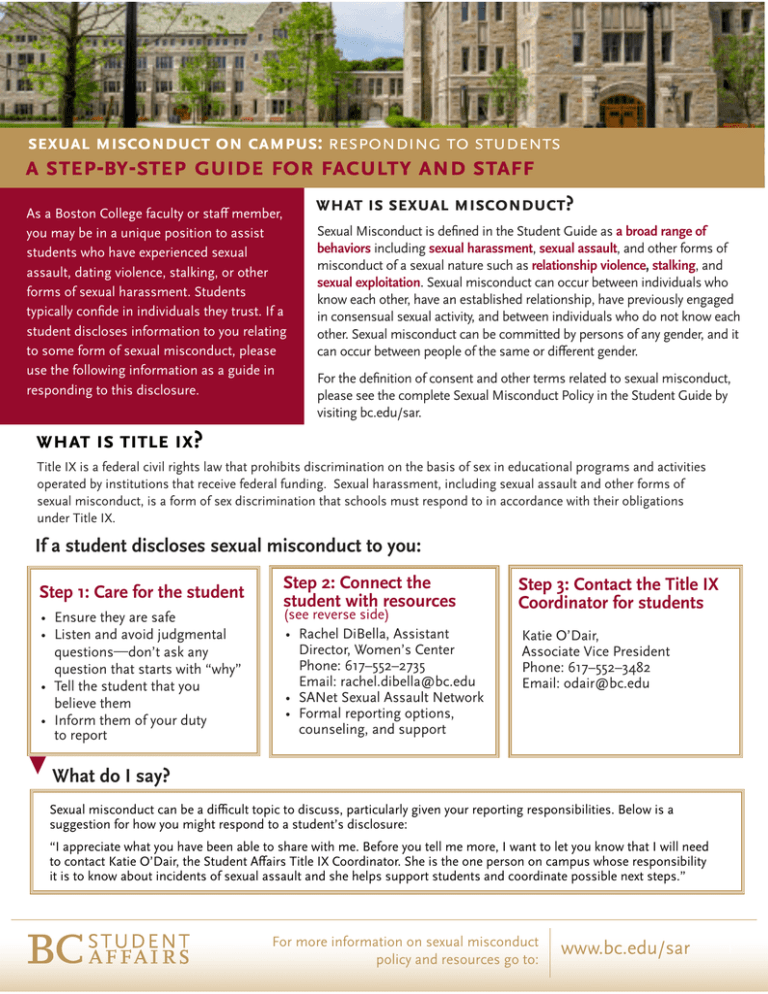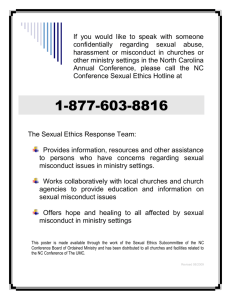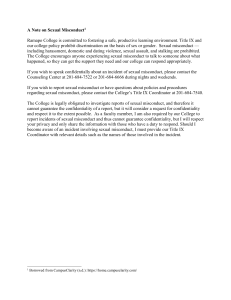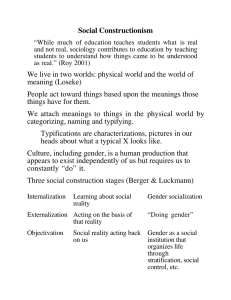
sexual misconduct on campus: responding to students
a step-by-step guide for faculty and staff
As a Boston College faculty or staff member,
you may be in a unique position to assist
students who have experienced sexual
assault, dating violence, stalking, or other
forms of sexual harassment. Students
typically confide in individuals they trust. If a
student discloses information to you relating
to some form of sexual misconduct, please
use the following information as a guide in
responding to this disclosure.
what is sexual misconduct?
Sexual Misconduct is defined in the Student Guide as a broad range of
behaviors including sexual harassment, sexual assault, and other forms of
misconduct of a sexual nature such as relationship violence, stalking, and
sexual exploitation. Sexual misconduct can occur between individuals who
know each other, have an established relationship, have previously engaged
in consensual sexual activity, and between individuals who do not know each
other. Sexual misconduct can be committed by persons of any gender, and it
can occur between people of the same or different gender.
For the definition of consent and other terms related to sexual misconduct,
please see the complete Sexual Misconduct Policy in the Student Guide by
visiting bc.edu/sar.
what is title ix?
Title IX is a federal civil rights law that prohibits discrimination on the basis of sex in educational programs and activities
operated by institutions that receive federal funding. Sexual harassment, including sexual assault and other forms of
sexual misconduct, is a form of sex discrimination that schools must respond to in accordance with their obligations
under Title IX.
If a student discloses sexual misconduct to you:
Step 1: Care for the student
• Ensure they are safe
• Listen and avoid judgmental
questions—don’t ask any
question that starts with “why”
• Tell the student that you
believe them
• Inform them of your duty
to report
Step 2: Connect the
student with resources
(see reverse side)
• Rachel DiBella, Assistant
Director, Women’s Center
Phone: 617–552–2735
Email: rachel.dibella@bc.edu
• SANet Sexual Assault Network
• Formal reporting options,
counseling, and support
Step 3: Contact the Title IX
Coordinator for students
Katie O’Dair,
Associate Vice President
Phone: 617–552–3482
Email: odair@bc.edu
What do I say?
Sexual misconduct can be a difficult topic to discuss, particularly given your reporting responsibilities. Below is a
suggestion for how you might respond to a student’s disclosure:
“I appreciate what you have been able to share with me. Before you tell me more, I want to let you know that I will need
to contact Katie O’Dair, the Student Affairs Title IX Coordinator. She is the one person on campus whose responsibility
it is to know about incidents of sexual assault and she helps support students and coordinate possible next steps.”
For more information on sexual misconduct
policy and resources go to:
www.bc.edu/sar
Boston College Resources and Response
boston college sexual assault
network (SANet): (617) 552–2211
• 24/7 private hotline for anyone affected
by sexual violence (even if the caller is not
a survivor)
• Staffed by trusted and trained advocates
• Callers have the option to remain anonymous
Advocates assist callers with:
• Understanding all options available to survivors
or friends of survivors, including accompaniment
through this often difficult journey
• Seeking professional support (on and off campus)
• Pursuing medical evaluation and treatment
(on and off campus)
• Evidence collection
• Reporting internally or through the police department
Please note that any relevant information disclosed during calls on the SANet hotline
is shared with the Student Affairs Title IX Coordinator.
student resources
student reporting options
Women’s Center
Rachel DiBella: (617) 552–2735
• Advocates for survivors.
• Provides all available options/next steps to
survivors or friends of survivors.
• Accompanies survivors on their healing journeys.
Office of the Dean of Students
Richard DeCapua, Associate Dean: (617) 552–3470
• Offers information to students about options
through the internal conduct system as well as
guidance and support regarding academic and
housing concerns.
• Provides students with details for stay-away orders
and other immediate concerns.
University Counseling Services (Confidential)
(617) 552–3310 (days); (617) 552–3227 (nights
and weekends)
• Provides professional and confidential counseling;
psychologist on-call 24 hours a day.
• Counseling available for survivors and other
affected members of the community.
Mission and Ministry
Maura Colleary: (617) 552–8443 or
Rick Rossi: (617) 552–6592
• Offers pastoral counseling and spiritual
direction to survivors and other affected members
of the community.
For more information on the Boston College
sexual misconduct policy and for additional
resources go to:
www.bc.edu/sar
Title IX Coordinator for Students
Katie O’Dair, Associate Vice President: (617) 552–3482
• Oversees the University’s response to sexual
misconduct reports.
• Ensures that appropriate measures are taken to
mitigate possible hostile environment.
Boston College Police
(617) 552–4444 (emergency); (617) 552–4440 (non-emergency)
• Provides assistance in pursuing legal action both on
and off campus.
• Puts students in touch with the On-Call Administrator
(outside normal business hours at BC).
• Offers transportation to local hospitals for related
medical services.
• Will take a report and a specially trained officer
will conduct an investigation which may involve
questions about the context, the assailant, the
scene of the crime, and any witnesses.





